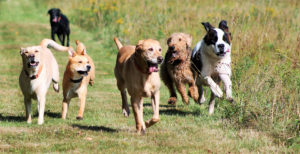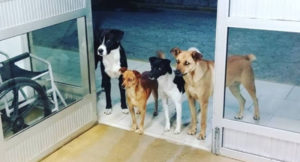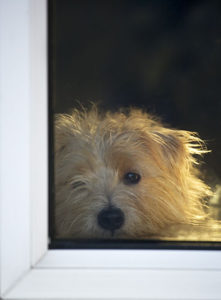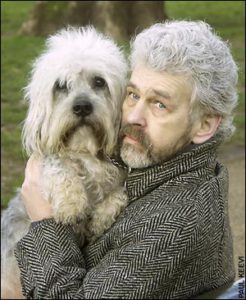Owner’s influence – who’s in charge!
 The owner’s influence is necessary to ensure rules are put into place, so your dog knows what is expected of him. Dogs are pack animals, in fact in a way, humans are also pack animals. Most predators have a structure within their family members. In a human family, Mum and Dad call the shots, until such time as the children grow up and leave the family home. Well that’s how it was when I was young, but nowadays I do wonder sometimes!
The owner’s influence is necessary to ensure rules are put into place, so your dog knows what is expected of him. Dogs are pack animals, in fact in a way, humans are also pack animals. Most predators have a structure within their family members. In a human family, Mum and Dad call the shots, until such time as the children grow up and leave the family home. Well that’s how it was when I was young, but nowadays I do wonder sometimes!
The team
Think of a football team. One man is the Captain and he is a team member chosen to be the on-pitch leader of the team. They are often an older or more experienced member of the squad. A player who can heavily influence the game. Yes, there are varying degrees of hierarchy, but it is everywhere, albeit rather subtle at times.
Rules and boundaries
We all need boundaries, rules and limitations. We as humans have codes of conduct. If those codes are broken, in law, the guilty party can be punished or even jailed. The problem with dogs is they never grow up! Unlike human children, domesticated dogs are always under the jurisdiction of their owners and so the boundaries, rules and limitations apply for the lifetime of the dog. If the owner does not take on the role of being in control of the household and its resources including food, a dog with dominant tendencies may fill the role. The consequences could be rather displeasing at best and dangerous at worst.
Some dogs are naturally chilled
 Some owners will find that some of these rules don’t have to be put into place with their dog. Perhaps the dog is of low energy and low reactivity and so he knows his place within the family without the owner having to reinforce it. Some dogs just naturally strive to do all that is asked of them. For those of you who own a dog such as this, well done. Most dog owners will be very envious of you! However, for those dogs who have a strong character or are prone to resource guarding, such as growling over their food, you need to watch out! Not addressing these problems can lead to aggression in some dogs.
Some owners will find that some of these rules don’t have to be put into place with their dog. Perhaps the dog is of low energy and low reactivity and so he knows his place within the family without the owner having to reinforce it. Some dogs just naturally strive to do all that is asked of them. For those of you who own a dog such as this, well done. Most dog owners will be very envious of you! However, for those dogs who have a strong character or are prone to resource guarding, such as growling over their food, you need to watch out! Not addressing these problems can lead to aggression in some dogs.
Introduce new rules slowly
The rules are quite simple. You can work through them as you train your dog. Some rules will be more difficult to enforce than others. It all depends on the character and temperament of your particular dog. If you’re intent on getting a puppy, you can get a clue as to how he may behave by looking into his breed traits before acquiring him. If you’re giving a home to a rescue dog then it will be more hit and miss as to how he will behave. So let’s get to it:
Don’t treat your dog like a child
Do not treat your dog like a child. Dogs do not react to stimuli in the same way as children do. Let your dog be a dog and remember he has needs just like you. If you intend acquiring a dog but will be out at work for 8 hours of the day, then you must make sure your pet does not suffer from separation anxiety, if he does, get professional help. In my opinion a dog should not be left for more than 4-5 hours max. You may need to think about a dog walker or pet sitter, or even doggy day care. If this is not possible, think again before giving a dog a home.
 Introducing your dog to his home
Introducing your dog to his home
When you bring your new charge home for the first time, be it a puppy or a rescue, make sure he is behind you when you enter the house for the first time. Introduce him to the various rooms in the home little by little, walking into each room first and then inviting him in. Don’t let him go charging around the place like he owns it. In his mind, he may think he does. Again, this depends on the dog and you will soon get to know his character and energy level and his little foibles or phobias, if he has any.
Fussy eater?
Is he a finicky eater? If so, find out what foods he really enjoys, then stick with it. If you pander to his every whim with regards to food, he could become a fussy eater, if he’s not already. There is a plus side to those dogs that will eat anything. On the other hand, you have to watch scavenging which is often a favourite pastime of an ‘eat anything’ dog. Many of which have landed up at the vets after eating something inappropriate. So the important resource of food should be completely under your control.
 We want our dogs to be good house dogs but…
We want our dogs to be good house dogs but…
We want our dogs to be good house dogs but some go over the top and continue barking and running around excited, even after the event. Let him bark a couple of times then command him to stop with an ‘enough’ command or perhaps ‘quiet’ which I use on my dogs. If they continue to ignore you and carry on barking then put them in time out for a while or shut them out of the room for a few minutes. You could also teach him the ‘speak’ command. This may seem counter productive but once he learns to speak and already knows ‘quiet’, he should stop barking. (I will have to give some hints on teaching these commands in another post.)
You initiate all events
It is up to you to initiate all events. This includes letting your dog on the bed, on the settee, on your lap etc.. Those dogs that take it upon themselves to jump on you or a visitor whenever they want are called ‘space invaders’. This is disrespectful behaviour. If your dog asks to jump up by sitting looking at you, then you can decide if you want him on your lap or not. For instance, if you’re reading the newspaper, a dog on your lap could be awkward. If you don’t want him on you, tell him ‘No’ firmly. He will not take offence but likely just lie down. After a while you can reward him by asking him up on your lap or to sit next to you on the settee. Our dogs are not allowed on the bed until we invite them up. They are only allowed up in the mornings while we’re drinking our first cuppa in bed. If they are wet or mucky from being let out, then they are not allowed up. This saves a lot of duvet cover washing.
 Coming and going
Coming and going
When coming in after leaving your dog for a while, ignore him. This sounds harsh but it is for the sake of your dog. It is best if he does not get excited when you leave or come home. This will induce calm behaviour. If your dog is uptight when you leave him because you have been talking to him, petting him and saying you won’t be long, he will likely stay in that frame of mind after you leave. Don’t make anything of leaving and returning. After a few minutes of him being calm after you return, you can call him over and play with him or give him some affection. By then he will not associate your affection with you returning home. We don’t want to reward anxious, excited or fearful behaviour.
Mastering the walk
Mastering the walk is the pinnacle of the behaviour we want from our dog. If he is well behaved on all aspects of the walk, including recall, we can enjoy time spent together outdoors where mosts dogs likes to be. Where does training for the walk begin? At home with your puppy. The earlier you can train your puppy to walk with you off lead, the better. If you acquire an older or rescue dog, it probably won’t take long for you to assess if he will be a problem out walking. Get the walk sorted as soon as possible. If you can master the walk, most other problems will start to fall into place. Dogs need to walk out away from their home. It is psychologically necessary for them. If they are not walked regularly, they are likely to suffer anxiety, tension and possibly become aggressive. Even a low energy dog needs to get out and about on a daily basis. You must make time to exercise your dog. This keeps him socialised and habituated, very necessary for a well balanced, healthy and happy dog.
We are all unique
Each dog is unique, just as we humans are all unique. This makes the task a little more problematic with some dogs. Generally though, a solution can be found to suit each dog and most will be eager to please their owner. But remember, it is not just about your dog. It is also about you as a person. How you cope with situations. Are you a calm person or are you liable to get stressed easily. Are you impatient and always striving to be the best you can be. Or are you laid back with a ‘san fairy ann’ attitude.
you can be. Or are you laid back with a ‘san fairy ann’ attitude.
Get help if you’re not happy
Whatever personality traits you have, they will impact on your dog, whether it be positive or negative. It goes without saying that a calm, assertive and confident owner is ideal, but to be in this calm emotional state at all times is a big ask.
Sometimes it’s hard work!
Most of us find it’s really hard work to be the ideal owner for their precious pet all of the time. But you don’t have to struggle on if you’re not happy with your dog’s behaviour. There are many dog behaviourists out there ready to step into the breach and help you sort out unwanted behaviours and ensure a happy and healthy relationship with your faithful friend.

Thanks for this article. There was a time in my life when I tried to hard to control dogs. Like if I took my cousin’s dog out for a walk I’ll be really mean to them if they talked on a leash or stuff like that. Nowadays I am really nice to dogs. I feel sorry that I used to be so mean to dogs.
There was a dog at my house in college and I got a lot of satisfaction out of teaching them some tricks like giving a paw and rolling over and how to come when someone said come. I think the I did those things in fairly ethical ways which did not hurt the dog. Like as long as it doesn’t hurt the dog.
The hard part is that we can’t communicate clearly with dogs. So I think that’s where a lot of the trouble comes from. Sometimes I think people are sort of too strict with their dogs Or they even take out their own issues on dogs.
like I saw this one guy in the nature trail and he was way too mean to his dog. It was very upsetting to see. So I hope that you did not encourage anything like that on this website.
Hi Charles, to answer your last query first, it does not help to be mean to a dog. As best it confuses them, at worst it can actually cause aggression. This, of course, depends on the dog’s character and how it has been raised as a puppy from 3 – 16 weeks. This period is critical and many dogs will show unwanted behaviours because of their upbringing during this vital stage.
There is no need to be mean or rough with any dog, in fact, it can definitely stunt your relationship with your dog. If you are calm, assertive and patient, your dog will want to please. If you acquire a dog that has issues, calm, patient but firm is essential.
Very interesting, I have seen a few of my friends dogs that seem to be in charge or get treated like babies. Not that I will tell them they are wrong but I might direct them to your website. I really enjoyed reading your thorough info, I really want to get a dog and a friend at works keeps suggesting we have her border collie as she lives on a farm and they had a big litter. but I have said that we are out all day and it would be unfair to any dog. I assume that some breeds are more intelligent and need more stimulus and lower/higher levels of exercise?
It was interesting what you said about low fuss on returning because my Brother-in-Law gets us to do this as his Cocker poodle use to nearly knock me over with excitement every time we visited. He use to run around the room then jump on and off me numerous times….. for about ten minutes. But now they hold his collar and we ignore him for a little while then when he calms down he gets a hello stroke. It work really well like you say.
Hi there Karen and thanks for reading the post and giving your input. You are right to be careful about having a dog when you’re out much of the day. Particularly a Border Collie which if left in the house for a while will probably start entertaining herself, if you get what I mean! Also these dogs are the top of the tree of intelligence and I mean the top. They are the most intelligent dog of the 400+ breeds out there.
If you do get a dog and are still out all day, you must make arrangement for someone to come in and break the day up. Perhaps doggy day care or a professional dog walker could be arranged. But you have to factor in the extra cost for these services.
Some breeds are more laid back than others so research possible breeds suitable for your personality and how much time you can spend with your pet. I would advise you to wait until your dog can be with you for much of the day. I advocate not leaving a dog for more than 4-5 hours at a time. You seem a caring person, ideal as a dog owner but do your research before taking a dog on. Once you have her, it can be heart breaking if you have to rehome because you don’t have the necessary time to look after her needs. Good luck!
I don´t have a dog of my own, but I’ve been dog sitting, and thus have some experience with dogs. By the way, I didn’t know that a dog needs to be behind you, when you bring a dog to its new home! That´s very interesting. That was also new to me that you should ignore your dog for a few minutes when you come in.
Thank you for a great article! I learnt some new things about dog training. Someday I´d like to have a dog of my own, and maybe the day will come when I will make that dream come true.
Hi there Kirsti, I sincerely hope your wish will come true. A dog will change your life. If you are passionate about giving him the best life possible, you will make a faithful and loyal friend.
Hi, your post is really unique and educating because it really help me.to understand dog behaviour, I am really happy that I came.across your post when am planning to get my dog, I will make.use of every advice that was stated in your post, for dog lovers in my friend list I will be sharing your post for them.to also benefit from.it.
Thanks for reading the post AD and also for sharing the blog. I sincerely hope it helps all dog lovers and owners to better understand what their pet is trying to say to them. Once you know their language, training becomes so much easier.
We have two dogs, one is a male black Labrador, “space invader” ,and the other is a female, miniature Alsatian fussy eater, both dogs get on fairly well, but the black Labrador, tends to tease the female.We also have two geese and the male just loves to chase them,we have to call him sharply,to make him stop.
.There is a problem, as we have to leave them sometimes, for the whole day as we go out to do flea markets, How ever they seem to be quite happy with that, as they are both together in the house. they don’t do any damage, and they are very happy to see us when we come home,although, they are a little boisterous when we arrive.
the Labrador has a problem with staying on the property, the stand is enclosed and we keep the gate locked, however whenever the gate is opened, to let the car in or out, or when we need to go out to speak to the neighbors, he rushes out and barks, at every house around that has a dog,and we have a terrible job getting him back inside the gate.
Hi there Robert. It does appear that your dogs are quite relaxed about you leaving the home. That’s good but just to be sure, why not put a camera in the house so you can see exactly what goes on. We did this with our two and realised that they were both a little concerned about being left, even for a short while. We worked out that they preferred to be left in a smaller area, rather than having the run of the whole house. So we put them in the bedroom where they sleep all night, put the camera up and eureka! They settled down immediately (after eating their kong treats) and slept until we came home.
As for your problem of dashing out, you can train them to know that open door or gate does not mean dash out. This may take a little time but try them first at the front door. Make them sit, stay while you go out the door for just a few seconds. Come back in and reward them, if they stay. If they don’t stay, stand in the doorway so they cannot get past you. Another way is to put a treat on the floor when you open the door so they have to eat it before rushing out but they must be calm first. Timing is of the essence! You can do it if you persevere. Knowing your dog is part of the answer. Does he like balls, or squeaky toys? Is one of them better than the other? If so work on the dogs one at a time if it’s easier, doing the better behaved one first.
As for barking around the neighbourhood, take him out for a walk and stop by each house that has a barking dog. Make him sit and turn him to face you with his back to the other dog. Be firm and calm at all times. Don’t let him look at the other dog. Once he calms down, you will notice the other dog will copy, or vice versa. You can treat him only when he calms down. Also make sure you leave the house with a calm dog. In other words, don’t put lead or collar on an excited dog. He must come out of the house after you and in a calm state. If he doesn’t, take the collar and lead off and start again after he calms down. Good luck!
In fact, I have learned a lot about dogs and how to handle them for my benefits. First I just use the trial and error in handling my dog and most times it gets me upset lol.
These animals are wonderful creature and mostly serve as a source of company when you are lone and learning to be with them is important to me, I have been searching the internet to see how I can learn about these animals and thank God I just find one and really appreciate the effort and time that you have taken to get this information on here.
What advice will you give me in handling bulldogs?. They are my favorite and I like to have them with me lol, I like to take a walk with them.
Thanks for this information and I look forward to reading more from this site
Hi Sumani, do you actually own a bulldog? This breed can be very stubborn and tenacious sometimes so you must make sure you are always calm and at the same time assertive when training him. Although they don’t need as much exercise as some breeds, it’s a good idea to keep him well walked so he is nice and tired when returning home. They do not tolerate the heat too well but are good for urban living and generally like other dogs too. They usually get along with children (never leave any dog alone with a small child).
Try not to get frustrated with your dog, if you get upset, he knows about it. Your calming and assertive demeanour will make training much easier and more enjoyable for both of you. Here is a site that will tell you all about the Bulldog.